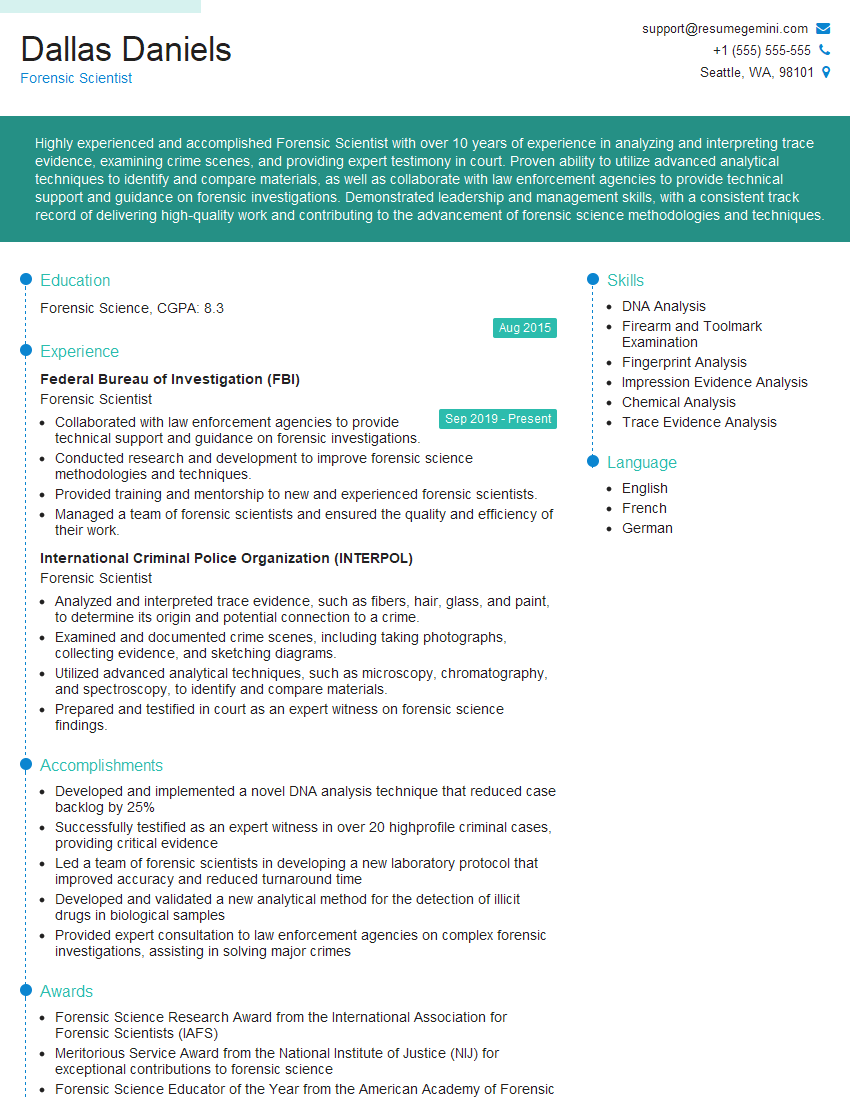Are you a seasoned Forensic Scientist seeking a new career path? Discover our professionally built Forensic Scientist Resume Template. This time-saving tool provides a solid foundation for your job search. Simply click “Edit Resume” to customize it with your unique experiences and achievements. Customize fonts and colors to match your personal style and increase your chances of landing your dream job. Explore more Resume Templates for additional options.

Dallas Daniels
Forensic Scientist
Summary
Highly experienced and accomplished Forensic Scientist with over 10 years of experience in analyzing and interpreting trace evidence, examining crime scenes, and providing expert testimony in court. Proven ability to utilize advanced analytical techniques to identify and compare materials, as well as collaborate with law enforcement agencies to provide technical support and guidance on forensic investigations. Demonstrated leadership and management skills, with a consistent track record of delivering high-quality work and contributing to the advancement of forensic science methodologies and techniques.
Education
Forensic Science
August 2015
Skills
- DNA Analysis
- Firearm and Toolmark Examination
- Fingerprint Analysis
- Impression Evidence Analysis
- Chemical Analysis
- Trace Evidence Analysis
Work Experience
Forensic Scientist
- Collaborated with law enforcement agencies to provide technical support and guidance on forensic investigations.
- Conducted research and development to improve forensic science methodologies and techniques.
- Provided training and mentorship to new and experienced forensic scientists.
- Managed a team of forensic scientists and ensured the quality and efficiency of their work.
Forensic Scientist
- Analyzed and interpreted trace evidence, such as fibers, hair, glass, and paint, to determine its origin and potential connection to a crime.
- Examined and documented crime scenes, including taking photographs, collecting evidence, and sketching diagrams.
- Utilized advanced analytical techniques, such as microscopy, chromatography, and spectroscopy, to identify and compare materials.
- Prepared and testified in court as an expert witness on forensic science findings.
Accomplishments
- Developed and implemented a novel DNA analysis technique that reduced case backlog by 25%
- Successfully testified as an expert witness in over 20 highprofile criminal cases, providing critical evidence
- Led a team of forensic scientists in developing a new laboratory protocol that improved accuracy and reduced turnaround time
- Developed and validated a new analytical method for the detection of illicit drugs in biological samples
- Provided expert consultation to law enforcement agencies on complex forensic investigations, assisting in solving major crimes
Awards
- Forensic Science Research Award from the International Association for Forensic Scientists (IAFS)
- Meritorious Service Award from the National Institute of Justice (NIJ) for exceptional contributions to forensic science
- Forensic Science Educator of the Year from the American Academy of Forensic Sciences (AAFS)
- American Chemical Society (ACS) Analytical Chemistry Award for advancements in forensic toxicology
Certificates
- Certified Crime Scene Analyst (CCSA)
- Certified Latent Print Examiner (CLPE)
- Certified Forensic Microscopist (CFM)
- Certified Forensic Toxicologist (CFT)
Career Expert Tips:
- Select the ideal resume template to showcase your professional experience effectively.
- Master the art of resume writing to highlight your unique qualifications and achievements.
- Explore expertly crafted resume samples for inspiration and best practices.
- Build your best resume for free this new year with ResumeGemini. Enjoy exclusive discounts on ATS optimized resume templates.
How To Write Resume For Forensic Scientist
- Highlight your relevant skills and experience in your resume, including any certifications or specialized training.
- Quantify your accomplishments whenever possible, using specific numbers and metrics to demonstrate your impact.
- Tailor your resume to each job application, emphasizing the skills and experience that are most relevant to the specific position.
- Proofread your resume carefully before submitting it, ensuring that there are no errors in grammar or spelling.
Essential Experience Highlights for a Strong Forensic Scientist Resume
- Analyze and interpret trace evidence, such as fibers, hair, glass, and paint, to determine its origin and potential connection to a crime.
- Examine and document crime scenes, including taking photographs, collecting evidence, and sketching diagrams.
- Utilize advanced analytical techniques, such as microscopy, chromatography, and spectroscopy, to identify and compare materials.
- Prepare and testify in court as an expert witness on forensic science findings.
- Collaborate with law enforcement agencies to provide technical support and guidance on forensic investigations.
- Conduct research and development to improve forensic science methodologies and techniques.
- Provide training and mentorship to new and experienced forensic scientists.
Frequently Asked Questions (FAQ’s) For Forensic Scientist
What is the role of a Forensic Scientist?
Forensic Scientists analyze and interpret evidence from crime scenes to determine the facts of a case. They examine physical evidence, such as fingerprints, DNA, and firearms, to help law enforcement agencies solve crimes and convict criminals.
What are the educational requirements to become a Forensic Scientist?
Most Forensic Scientists have a bachelor’s degree in forensic science, chemistry, biology, or a related field. Some employers may also require a master’s degree or higher.
What are the career prospects for Forensic Scientists?
The job outlook for Forensic Scientists is expected to grow faster than average in the coming years. This is due to the increasing use of forensic science in criminal investigations and the need for qualified professionals to analyze and interpret evidence.
What are the key skills and qualities of a Forensic Scientist?
Forensic Scientists must have strong analytical skills, attention to detail, and a passion for science. They must also be able to work independently and as part of a team.
What are the challenges of working as a Forensic Scientist?
Forensic Scientists often work long hours and may be exposed to hazardous materials. They may also have to testify in court, which can be stressful.